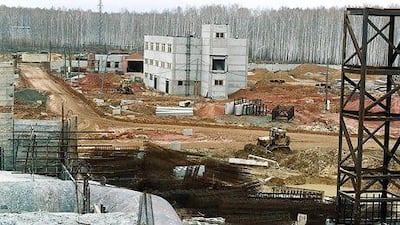Russia yesterday signed a landmark nuclear cooperation deal with the UAE, the final piece of diplomatic paperwork needed to provide uranium from around the world to fuel Abu Dhabi's atomic energy needs until 2035.
Over the past five years Abu Dhabi has signed such treaties with the United Kingdom, the United States, France, Australia and Canada.
In August, Emirates Nuclear Energy Corporation (Enec), Abu Dhabi's nuclear builder, awarded a US$3 billion (Dh11bn) contract to companies from those countries and Russia for 15 years worth of supply for its four planned reactors.
Sergey Kirienko, director general of the Russian state nuclear energy company Rosatom, said Moscow and Abu Dhabi had similar visions in developing atomic power despite sitting on some of the world's biggest oilfields.
"Russia has lots of hydrocarbon reserves - it is a thing that unites our countries," Mr Kirienko said after signing the treaty in Abu Dhabi yesterday with Mohammed Al Hamli, the UAE Minister of Energy. "It is important that countries with fossil fuels reserves develop nuclear - it highlights the competitiveness of nuclear energy."
Russia's Tenex is supplying natural uranium and enrichment services to the UAE civil nuclear programme - the first to be launched since the 1986 Chernobyl disaster - alongside Uranium One, a company based in Canada that is 51 per cent owned by a Rosatom subsidiary.
The atomic cooperation could in theory expand to building reactors or uranium exploration, said Hamad Al Kaabi, the UAE representative to the International Atomic Energy Agency.
"The scope of this agreement allows for wide implementation," said Mr Al Kaabi, the chief negotiator in the Government's nuclear cooperation deals.
"There may be additional contracts."
Russia is notable as a fuel supplier because it is the first nation to agree to take back spent fuel from another country.
It signed a "fuel leasing" deal with Iran designed to prevent nuclear waste from being siphoned off into a weapons programme, though the plan has yet to be put into practice.
Finding suppliers who will take back radioactive waste has been a priority in the UAE nuclear programme since it was proposed in 2008. Fuel leasing would relieve the Emirates of the costly prospect of building a long-term underground storage site on its own land, or the diplomatically complex task of collaborating on a shared repository with other Arabian Gulf nations.
But it has been hard to find countries willing to brave public sentiment and take the waste back. Bob Carr, Australia's foreign minister, ruled it out while signing a cooperation deal in Abu Dhabi earlier this year.
Mr Kirienko praised the UAE's nonproliferation regime. A 2009 treaty with the US rules out enrichment or reprocessing in the Emirates.
"From this point of view the United Arab Emirates has an exceptional reputation," Mr Kirienko said. "It is the question of safety and security, and it requires experience and proven technology."
The last tranche of financing for the US$20bn nuclear plant, being built by a Korean consortium in a remote site 300 km from the capital, is awaiting approval from the Executive Council. So far the US's export import bank has committed $2bn and South Korea's export credit agency, together with a set of other banks, has lined up $10bn. Engineers began pouring concrete for the first reactor foundation at Baraka in July.

